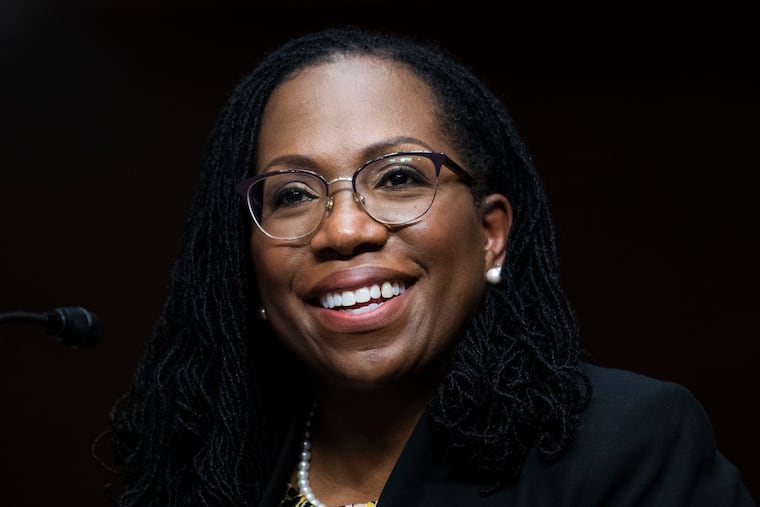Biden’s Supreme Court pick offers lessons on representation for Pa. judiciary | Opinion
The president's selection of Judge Ketanji Brown Jackson offers a shining example for state courts, where judges of color remain the exception, writes Kadida Kenner.

Our nation’s courts face a crisis of credibility. At the highest level, public approval of the U.S. Supreme Court is in freefall. Politicization of the appointment process and controversial decisions from the court have undermined trust among Americans, while an endless deluge of dark money from special interest groups continues to flood federal and state judiciaries. With all this happening, Supreme Court Justice Stephen Breyer’s decision to step down from the bench presents a rare chance for elected officials to come together and begin the hard work of improving the court’s credibility.
President Joe Biden’s nomination of Judge Ketanji Brown Jackson, the first-ever Black woman Supreme Court nominee — 55 years after Justice Thurgood Marshall became the first Black man appointed to the court — is groundbreaking. For the first time in the court’s history, millions of Black women and girls in this country will finally be able to see themselves and their lived experiences reflected back at them from the bench. In doing so, Jackson’s appointment marks the first step of a long process in restoring trust in the court. It also offers a lesson for Pennsylvania’s state courts.
As an American, judicial independence activist, and a Black woman, I can’t overstate the importance of a representative and highly qualified judiciary. Pennsylvanians, like all Americans, expect their judges to represent them, their lived experiences, and their communities. People are more likely to trust courts they feel connected to — and ultimately, trust is what our judicial system operates on.
» READ MORE: Biden taps Ketanji Brown Jackson for Supreme Court seat, according to AP source
But that trust can’t fully exist if our judiciary is monolithic. Unfortunately, in Pennsylvania, that’s currently the case. Judge Jackson offers a shining example for Pennsylvania’s state courts, where judges of color remain the exception. In Pennsylvania’s history, there have only been three people of color to ever sit on the commonwealth’s highest court. Justice Robert N.C. Nix Jr. is the only elected Supreme Court justice of color in Pennsylvania history, serving on the bench from 1972 to 1996. Justices Juanita Kidd Stout and Cynthia Baldwin, on the other hand, were both appointed for interim terms between elections. Not a single justice of color has won an election for a seat on the state’s highest court in 25 years — that’s despite people of color making up more than a quarter of Pennsylvania’s population.
The sad reality is that Pennsylvania is far from an outlier when it comes to representation. A recent tally showed that there were 22 states with an all-white state Supreme Court, including 11 states where people of color make up 20% or more of the population. Further research reveals that such disproportionate representation is the rule in our highest courts, not the exception. People of color make up almost 40% of the U.S. population, but less than 17% of state Supreme Court seats.
Representation on the bench offered by immensely qualified judges like Jackson not only leads to better decision-making and fairer rulings, it builds confidence in the judiciary. It also provides role models for all people, as well as an example for judges on other, less representative courts.
Representation isn’t a panacea, however.
» READ MORE: It’s time to nominate more defense attorneys to be judges | Opinion
Take the U.S. Supreme Court, for example. Even if Jackson is appointed by a 100-0 vote in the U.S. Senate, there will still be huge problems to fix.
The U.S. Supreme Court has diluted protections in the Voting Rights Act down to the bare bones, it’s allowed dark money to run rampant in our judicial elections, and looked the other way while partisan gerrymandering debased our elections. In June, the court could do even more damage if — as many expect — it overturns Roe v. Wade, thereby creating a dark and dangerous new reality for millions of Americans.
The confirmation of one Black female justice will not fundamentally alter any of that. However, it will affect how millions of Black women and our families view the court. The same goes for the state judiciary in Pennsylvania.
“I might disagree with court rulings at times, but at least I’ll know that someone like me played a part in deciding them.”
Life experiences invariably shape the opinions of every judge in the country. What that means in practice is that far too often the experiences of Black women aren’t being represented by judges deliberating important cases that affect us in life-changing ways. Knowing that your perspective is adequately represented in the courts makes handling difficult decisions easier. I might disagree with court rulings at times, but at least I’ll know that someone like me played a part in deciding them.
With public confidence in our nation’s judiciary dwindling, it’s imperative that better representation be prioritized, from the lowest level Pennsylvania state court all the way up to the U.S. Supreme Court. It won’t fix everything, but at least it’s a step in the right direction. That’s progress.
Kadida Kenner is the founding executive director of the New Pennsylvania Project, a voting rights organization with a primary focus on voter registration, and cochair of Why Courts Matter — Pennsylvania, a campaign educating Pennsylvanians about the importance of the independence of both the federal and state courts. She writes from Chester County.